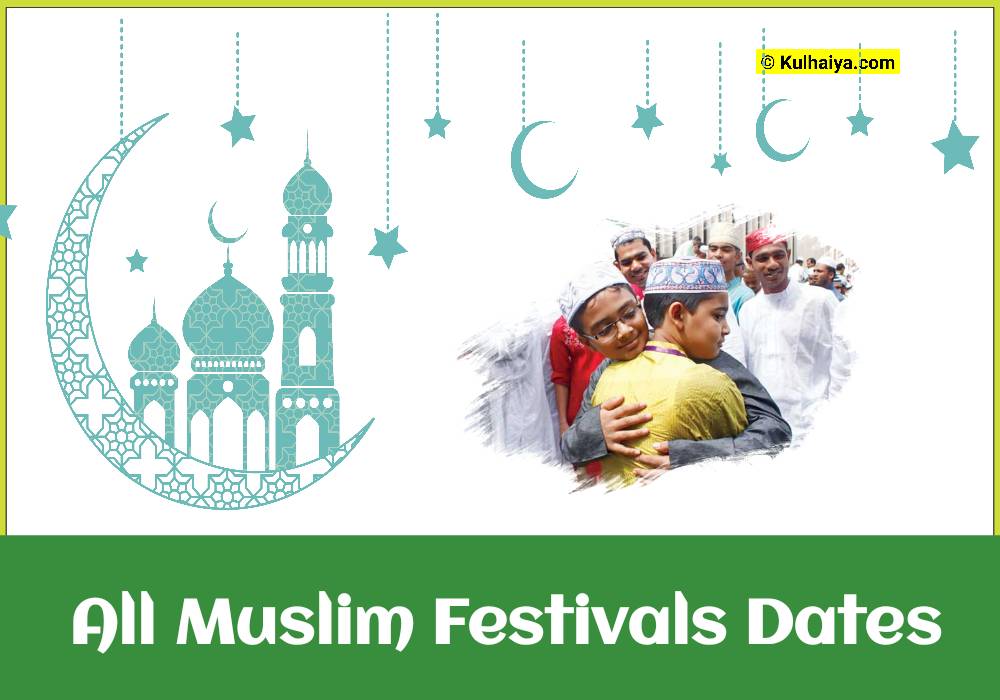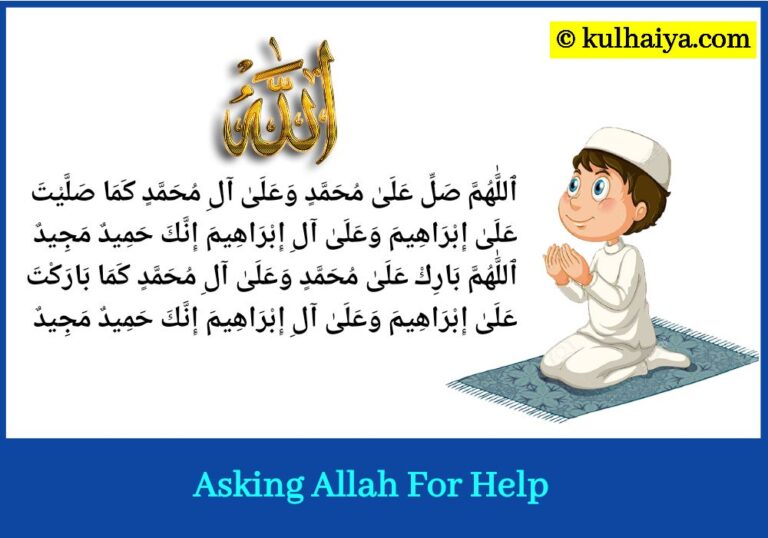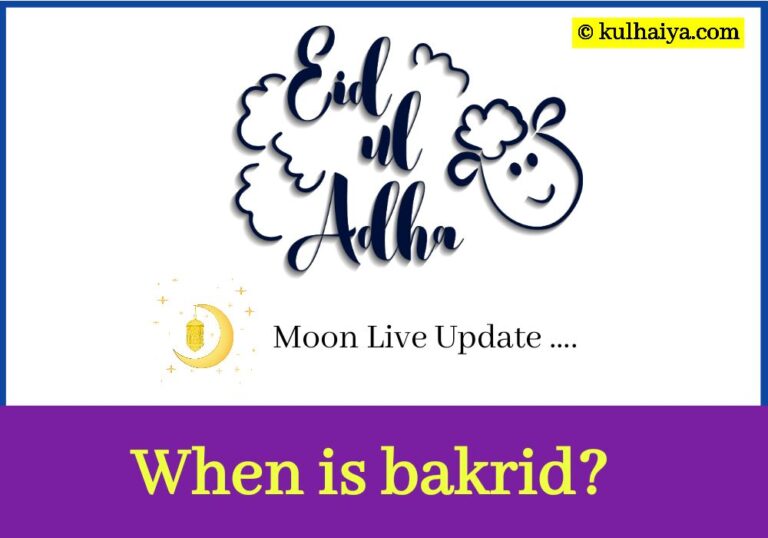As-salamu alaykum, dear brother and sisters. Are you searching for a list of Islamic festivals and also a list of Muslim festivals in India? Your search ends here, just a click. Please scroll down at the end.
| Today, on March 11th, the crescent moon marking the beginning of the month of Ramadan was sighted. As a result, the first day of Ramadan (1445) will fall on Tuesday, March 12th, 2024. This announcement was made by the Imarat Shariah Hind and the Ru’yat-e-Hilal Committee, Ajmer.
Kulhaiya News Team, India |
|
Muslims celebrate many festivals throughout the year. Each festival has its unique traditions and is celebrated in a particular way. Here are a few of the more well-known Muslim festivals: Eid al-Adha, Eid al-Fitr, Mawlid an-Nabi, and Eid ul-Azha.
All Muslim Festivals Names – According to Hijri Calendar Month Wise
Check Out the Muslim Festivals Names for Each Month!
Muslim festivals are named according to the Islamic Hijri calendar, Islamic months and their festivals.
First Month Muḥarram
Muḥarram is the first month of the Islamic lunar calendar. It is one of the four sacred months of the year, during which warfare is forbidden. The name Muḥarram means “Forbidden”.
- 12th day of the month, celebrate Al-Hijra / Muharram / Ashura.
Second Month Ṣafar
Safar is the second month in the Islamic calendar. It is believed to have been named after Safar, an uncle of the Prophet Muhammad. The month is generally associated with misfortune and bad luck.
- No festivals.
Third Month Rabi al-awwal
The third month of the Islamic calendar is known as Rabi al-awwal. This month is significant because it is the month Muhammad, the Prophet of Islam, was born.
Muslims commemorate Muhammad’s birth by celebrating Milad un-Nabi, or the Prophet’s birthday. Special prayers and gatherings with friends and family typically mark this event.
- 12th day of the month, celebrate Mawlid al-Nabi.
Fourth Month Rab ath-thani
Rab at-Thani is the fourth month of the Islamic calendar. This month is typically marked by fasting during daylight hours and charity work. Muslims believe this is a time when Allah looks most favourably upon them.
- No festivals.
Fifth Month Jumada al-Ula
This month in the Islamic calendar is named Jumada al-Ula, meaning “the fifth month.” This month falls in the fall season and is one of the four sacred months in Islam.
- No festivals.
Sixth Month Jumada al-akhirah
The sixth month of the Islamic calendar is Jumada al-akhirah. It is one of the four sacred months of the year in which fighting is forbidden. It is also when Muslims are encouraged to give charity and perform good deeds.
- No festivals.
Seventh Month Rajab
Rajab is the seventh month in the Islamic calendar and is considered holy. Many Muslims believe it is one of the four holiest months of the year, and it is believed that good deeds performed during this month are more likely to be rewarded by Allah.
- Isra and Miraj or Lailat al Miraj – 27th day of Rajab but unrecognized.
Eight Month Shaban
Shaban is the eighth month of the Islamic calendar. It is believed to be the month God determines people’s destinies for the coming year. Muslims are encouraged to pray and repent during this month.
- Mid shaban celebrate Shab – e – Barat / Lailat al Bara’a.
Nine Month Ramadan
The Islamic calendar is lunar, meaning it is based on the moon’s phases. Therefore, the first day of Ramadan falls on the ninth month of the Islamic calendar. Muslims believe that Ramadan is when Allah (God) blesses them with special blessings.
During Ramadan, Muslims are required to fast from sunrise to sunset. They are also encouraged to read the Quran and to pray more often than usual.
- Ramadan Fasting the whole month.
- Laylat Al Qadr may be on Ramadan’s 19th, 21st, 23rd, 25th, or 27th days.
- Quds Day is the last Friday of Ramadan.
Tenth Month Shawwal
The tenth month in the Islamic calendar is Shawwal. This month is significant because it marks the end of Ramadan, a month of fasting and prayer. Muslims celebrate Eid al-Fitr, or “the feast of breaking the fast,” at the end of Ramadan. Shawwal is also a time for charity and giving to those in need.
- 1st day of the month celebration of Eid al-Fitr.
Eleventh Month Dhu al-Qa dah
Dhu al-Qa dah is the eleventh month of the Islamic lunar calendar. The month is significant because it is one of the four sacred months in which warfare is prohibited. Dhu al-Qa dah is also a pilgrimage to Mecca, as it is one of the two months during which Muslims are allowed to do the Hajj.
- No festivals.
Twelfth Month Dhu al-Hijjah
The 12th month of the Islamic calendar is known as Dhu al-Hijjah. This is the month in which the Hajj, or pilgrimage to Mecca, must be performed by all non-disabled Muslims who can do so.
The month is also associated with several critical religious events, including the Festival of Sacrifice, commemorating the Prophet Ibrahim’s willingness to sacrifice his son Ismail.
- The Hajj and Eid al-Adha.
- Hajj – 8th, 9th, and 10th of month.
- Eid al-Adha – 10th of the month.
- The Day of Arafah 9th day (2nd day of Hajj) of this month.
A List of Muslim Festivals to Help You Celebrate Your Faith
How many festivals are in Islam?
- Al-Hijra / Muharram /Ashura
- Mawlid al-Nabi
- Isra and Miraj / Lailat al Miraj
- Shab – e – Barat / Lailat al Bara’a
- Ramadan
- Laylat Al Qadr
- Quds Day
- Eid Fitr
- Hajj
- Day of Arafah
- Eid al-Adha.
List of Muslim Festivals in India 2024
This is a list of Muslim festivals in India for the year 2024. The dates may vary slightly depending on the lunar calendar.
The first biggest festival is Eid al-Fitr, which marks the end of Ramadan, the Islamic holy month of fasting. Eid al-Fitr is celebrated with prayers and special meals. The second festival is Eid al-Adha, commemorating the Prophet Abraham’s willingness to sacrifice his son Ishmael.
You can also find a list of Muslim festivals dated from 2013 to 2024; all future dates are calculated astronomically based. Future festival dates may vary on the actual sighting of the moon.
The date of Muslim festivals may also vary from country to country depending on whether condition the moon has been sighted clearly or not।
If you want the actual date of the festival, please revisit this page and get the latest moon updates।
Al-Hijra / Muharram /Ashura
Muharram is the Islamic New Year. It is one of the four sacred months of the year in Islam. Muharram is celebrated to commemorate the martyrdom of Imam Hussein, the grandson of Prophet Muhammad.
- 2013 – November 14
- 2014 – November 04
- 2015 – October 24
- 2016 – October 12
- 2017 – October 01
- 2018 – October 21
- 2019 – October 11
- 2020 – 28/29 August
- 2021 – 18/19 August
- 2022 – August 09
- 2023 – 29 July
- 2024 – 16/ 17 July.
Mawlid al-Nabi
Mawlid al-Nabi is an annual observance in Muslim communities that celebrates the birth of the Islamic Prophet Muhammad. The holiday is celebrated on the 12th Rabi’ al-awwal, the third month in the Islamic calendar.
Events and activities associated with Mawlid al-Nabi often include recitations of poetry about Muhammad, sermons, lectures, and readings from the Quran. Marches and processions are also standard features of the celebration.
- 2013 – January 24
- 2014 – January 13
- 2015 – January 03
- 2016 – December 12
- 2017 – December 01
- 2018 – November 21
- 2019 – November 10
- 2020 – 03/04 November
- 2021 – 21/22 October
- 2022 – October 09
- 2023 – 28 September
- 2024 – 17/18 September
Isra and Miraj / Lailat al Miraj
The Islamic holiday of Lailat al Miraj commemorates the night the Prophet Muhammad is said to have been taken on a miraculous journey from Mecca to Jerusalem and Heaven. This journey is known as the Isra and Mi’raj.
According to Islamic tradition, Muhammad was transported on a magical horse called Buraq and met with other prophets during his journey. He also received instruction from Allah about how to lead the Muslim community.
- 2013 – 5th of June
- 2014 – 25th of May
- 2015 – 15th of May
- 2016 – 3rd of May
- 2017 – 23rd of April
- 2018 – 13th of April
- 2019 – 3rd of April
- 2020 – 22nd of March
- 2021 – March 10
- 2022 – 27/28 February
- 2023 – 13/14 February
- 2024 – 11/13 February.
‘Shab-e-Barat Dates For This Year Revealed!’
Shab-e-Barat is an important Muslim festival celebrated the night before the 15th day of Sha’ban, the 8th month of the Islamic calendar. Muslims believe that on this night, Allah SWT decides the fate of all human beings for the upcoming year. They pray and seek Allah’s forgiveness for their sins.
Shab-e-Barat, meaning ‘the night of forgiveness’ in Arabic, is a Muslim festival that celebrates the night when Allah (God) forgives the sins of his believers. This year (2023) Shab-e-Barat will fall on the evening of March 07. Muslims believe that on this night, Allah opens up the gates of heaven and grants his followers special blessings.
- 2013 – 23rd of June
- 2014 – 12th of June
- 2015 – 1st of June
- 2016 – 21st of May
- 2017 – 11th of May
- 2018 – 1st of May
- 2019 – 20th of April
- 2020 – 07/08 April
- 2021 – March 28
- 2022 – March 18
- 2023 – March 07
- 2024 – 25 February.
Ramadan Dates: What to Expect This Year
Ramadan is a Muslim religious festival commemorating the first revelation of the Quran to Muhammad, the founder of Islam.
Muslims observe Ramadan by fasting from dawn to sunset for 29 or 30 days, depending on the year. They break their fast with a meal called iftar and then spend the evening praying, reading the Quran, and socializing.
Ramadan dates are based on the lunar calendar, so it moves around 11 days every year on the Gregorian calendar. This year, Ramadan begins 12th March and ends around 9th or 10th April. Muslims are expected to abstain from eating, drinking, and sexual activity from sunrise to sunset during Ramadan.
- 2013 – July 09 (start)
- 2014 – 28th of June
- 2015 – 18th of June
- 2016 – 6th of June
- 2017 – 27th of May
- 2018 – 14th of May
- 2019 – 5th of May
- 2020 – 25/26 April
- 2021 – 12/13 April
- 2022 – April 03
- 2023 – March 24
- 2024 – 12 March.
How will the date for Eid al-Fitr change each year?
The Eid al-Fitr festival celebrates the end of Ramadan, a month of fasting and prayer. Muslims around the world gather to mark the occasion with prayer and festivities. The holiday is also a time for family reunions and exchanging gifts.
The Islamic calendar is based on the lunar cycle, meaning that Eid al-Fitr’s date will change each year. The holiday falls on the first day of the month of Shawwal, which is determined by sighting the new moon.
Because the lunar cycle is shorter than the solar cycle, the date for Eid al-Fitr moves backwards by about eleven days each year.
- 2013 – 8th of August
- 2014 – 28th of July
- 2015 – 17th of July
- 2016 – 5th of July
- 2017 – 25th of June
- 2018 – 16th of June
- 2019 – 5th of June
- 2020 – May 25
- 2021 – 12/13 May
- 2022 – 03/04 May
- 2023 – 22 April
- 2024 – 10/11 April.
Most excellent Holiday of the Year? Eid al-Adha Falls on Different Dates Each Year
The Islamic holiday of Eid al-Adha commemorates the willingness of Ibrahim (Abraham) to sacrifice his son, Ishmael, as an act of submission to God’s will. Muslims believe that Ibrahim was willing to make this sacrifice because he believed that God would provide for him a better replacement.
The holiday is celebrated by sacrificing a lamb or other animal and distributing the meat among family, friends, and people experiencing poverty.
The Islamic holiday Eid al-Adha is celebrated by Muslims worldwide each year and falls on different dates based on the lunar calendar.
- 2013 – 15th of October
- 2014 – 4th of October
- 2015 – 23rd of September
- 2016 – 11th of September
- 2017 – 1st of September
- 2018 – 22nd of August
- 2019 – 12th of August
- 2020 – 03/04 August
- 2021 – July 21
- 2022 – 07/08 July
- 2023 – June 29
- 2024 – 16/17 June.
Conclusion Point
Let us tell you that the Islamic festival is decided according to the Hijri calendar. The sighting of the moon determines the first date of the Hijri calendar.
The date of the festivals for the coming years has been written, but it can also change. We update every month according to the moon. You are requested to keep visiting this page from time to time. Thanks for visiting my Website for All Muslim Festivals Names & Dates.
FAQs+
FAQs Islamic festivals refer to a series of questions that are frequently asked by Muslims regarding the religious holidays celebrated in Islam. The questions can range from the holiday’s purpose to how to celebrate it properly.
The answers to these questions can help Muslims better understand the meaning and significance of these holidays.
Question: What are the Two Great Islamic Festivals, and What do They Celebrate?
Answer: What are the two great Islamic festivals, and what do they celebrate? Get the Best Answer. Two of the most significant Islamic festivals are Eid ul-Fitr and Eid al-Adha.
Eid ul-Fitr marks the end of Ramadan, a month of fasting and prayer, while Eid al-Adha commemorates the willingness of Abraham to sacrifice his son as an act of submission to God. Both festivals are celebrated with prayer, festivities, and gift-giving.
Question – How Many Festival In Islam?
Answer – Islam has five significant festivals, known as the “Five festivals of Islam.” These festivals are Eid al-Fitr, Eid al-Adha, Mawlid an-Nabi, Ramadan, and Lailat al-Qadr.
Question: Why is the Ramzan Festival Celebrated?
Answer: Ramzan is a festival celebrated by Muslims in commemoration of the first revelation of the Quran to Muhammad.
It is celebrated for an entire month, beginning with the sighting of the new moon. During Ramzan, Muslims fast from sunrise to sunset, abstaining from food, drink, and other pleasures. The end of Ramzan is marked by a feast called Eid al-Fitr.
Question – How many Muslim festivals are there in a year?
Answer: There are several major Muslim festivals celebrated throughout the year. The two main festivals are Eid al-Fitr and Eid al-Adha, which mark the end of Ramadan and the Hajj pilgrimage.
Other significant holidays include Ashura, Mawlid (the Prophet Muhammad’s birthday), and Milad un Nabi (Prophet Muhammad’s Ascension).
Eid al-Fitr is a three-day celebration that marks the end of Ramadan, a month of fasting for Muslims. It is typically celebrated with large gatherings of family and friends to share food and give gifts.
Eid al-Adha is a four-day celebration commemorating Abraham’s willingness to sacrifice his son in obedience to God. During this holiday, Muslims traditionally sacrifice an animal, such as a sheep or goat, to remember Abraham’s act of faith.
Question – How many festivals do Muslims celebrate?
Answer – Muslims celebrate two main festivals: Eid al-Fitr and Eid al-Adha. Eid al-Fitr is celebrated at the end of Ramadan, a holy month of fasting.
This festival marks the end of fasting and is celebrated with special prayers, family gatherings, and feasts. The second festival, Eid al-Adha, celebrates Abraham’s willingness to sacrifice his son for God. This is usually celebrated by sacrificing an animal and sharing the meat with family and friends.
In addition to these two major festivals, Muslims observe several other holidays throughout the year. These include Ashura (a day of remembrance for those who lost their lives in battle), Mawlid (the birthday of Prophet Muhammad), and Laylatul Qadr (Night of Power).
Muslims also celebrate other religious holidays, such as Hajj (the pilgrimage to Mecca) and Ramadan (the month of fasting).
Question – Which Muslim festival is today?
Answer: Today is the start of Eid al-Adha, also known as the Festival of Sacrifice. It is one of the two major Muslim festivals celebrated worldwide each year.
Eid al-Adha marks the end of the Hajj pilgrimage to Mecca and commemorates Prophet Abraham’s willingness to sacrifice his son Ishmael in obedience to God.
Question – What festival is tomorrow for Muslims?
Answer: Tomorrow is Eid al-Adha, one of the most important festivals of the Muslim faith. It is celebrated to commemorate the Prophet Abraham’s willingness to sacrifice his son for Allah. The festival lasts four days and includes various activities, such as exchanging gifts, visiting family and friends, and attending special prayers.
Muslims also make special meals for their families and friends during this time. Eid al-Adha marks the end of the annual Hajj pilgrimage to Mecca, which millions of Muslims take annually.
Question – What are the Islamic festivals?
Answer – Islam celebrates two major festivals: Eid al-Fitr and Eid al-Adha. Eid al-Fitr is celebrated at the end of Ramadan, the Islamic holy month of fasting. It marks the end of the fasting period and is a time for celebration with family and friends.
Eid al-Adha, also known as the Festival of Sacrifice, marks the end of the annual Hajj pilgrimage to Mecca. This festival commemorates Abraham’s willingness to sacrifice his son Ishmael in obedience to God.
Both festivals are celebrated with prayer, feasting, gift-giving, and other activities.
Question – What are the Islamic holidays in India?
Answer: India is a secular country with many religions, including Islam. There are four major Islamic holidays celebrated in India:
- Eid al-Fitr: This holiday marks the end of Ramadan and is celebrated with feasting and gift-giving.
- Eid al-Adha: This holiday commemorates Abraham’s willingness to sacrifice his son to God and is marked by communal prayer and animal sacrifices.
- Muharram: This holiday marks the beginning of the Islamic New Year and includes processions for martyrs during the Battle of Karbala.
- Milad un-Nabi: This holiday celebrates the birth of Prophet Muhammad and includes recitations from the Quran and special prayers.
Question – What is the significance of Islamic festivals and holidays?
Answer: Islamic festivals and holidays are critical to the Islamic faith. These celebrations commemorate essential historical moments, such as Prophet Muhammad’s birth or Ramadan’s end.
They also provide a time for people to come together and celebrate their faith with friends and family. Additionally, these festivals are a reminder of God’s mercy and blessings, and they strengthen bonds between Muslims worldwide.
Question – What is the Main festival of Muslims?
Answer: The main festival of Muslims is Eid al-Fitr, which marks the end of Ramadan. Ramadan is a month of fasting and spiritual reflection, and Eid al-Fitr celebrates the conclusion of this period.
It is celebrated with feasting, prayer, and gift-giving. It is also a time for special festivities such as parades and carnivals in some countries. Eid al-Fitr is an important holiday for Muslims worldwide and is celebrated in many ways depending on culture and geography.
Question – How many festivals are there in Islam?
Answer – Islam has two major festivals: Eid al-Fitr and Eid al-Adha.
Eid al-Fitr marks the end of Ramadan, the Islamic holy month of fasting. Muslims celebrate with family gatherings, feasts, and gifts.
Eid al-Adha celebrates sacrifice and commemorates Abraham’s willingness to sacrifice his son Ishmael for God. It is celebrated with prayer, feasting, and gift-giving.
Question – What are the three main Islamic festivals?
Answer: Eid al-Fitr, Eid al-Adha, and the Prophet Muhammad’s birthday are the three main Islamic festivals.
Eid al-Fitr marks the end of Ramadan and is celebrated with feasting and gift-giving.
Eid al-Adha honours Abraham’s willingness to sacrifice his son Ishmael and is marked by communal prayer and the slaughtering of a sheep or goat.
The Prophet Muhammad’s birthday is celebrated with special prayers, readings from the Quran, and other festivities.
Question – What is the best time to shop during the Muslim Festival?
Answer: The best time to shop during the Muslim Festival is correct before and during Eid al-Fitr, which marks the end of Ramadan. This is when Muslims celebrate with gift-giving, so shops are full of unique items.
Shoppers can also find great deals at the beginning of Ramadan, as stores often offer discounts on festive items. In addition, many stores offer monthly discounts to help people save money for their celebrations.
Finally, shoppers should take advantage of online shopping during the Muslim Festival. Many online stores offer discounts and free shipping during this time, making it easier to get what you need without leaving your house!
Question – What are some of the best deals available during the Muslim Festival?
Answer: During the Muslim Festival, a variety of great deals are available.
Many retailers offer discounts on traditional clothing and food items. Grocery stores often have sales on dates, nuts, and other special treats. Additionally, many restaurants offer discounts on their meals.
For those looking for more unique gifts, many online stores offer special discounts for the holiday season. These include jewellery, home decor items, and more.
Finally, remember to take advantage of local events and activities that may be taking place during the festival. Many cities host special celebrations with live music, art exhibitions, and more – all at discounted prices!
Question – What are some of the best ways to save money during the Muslim Festival?
Answer: There are several ways to save money during the Muslim Festival.
First, plan and create a budget. Set aside a certain amount for gifts and celebrations and stick to it. When shopping for presents or decorations, look for sales or discounts that may be available. Consider making homemade gifts instead of buying them, saving you money.
Second, try to reuse items you already have. Decorations from previous years can be reused and repurposed in creative ways. If you plan to host an event, use items like plates and cups you own rather than buying new ones.
Consider reducing the number of guests at your event or celebration. This will reduce the cost of food and drinks and any entertainment costs. It is also important to remember that celebrating with family and friends is more important than spending much money on gifts or decorations.




